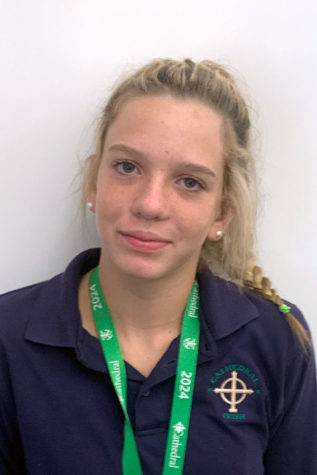More vaccines = fewer cases, school nurse says
Mrs. Vogt sees benefit for both younger children, their parents
Approval of the Pfizer vaccine for children between the ages of 5 and 11 will have a positive effect on educators who have sons and daughters in that age group, according to school nurse Mrs. Marianne Vogt ‘83.
The Pfizer Covid-19 vaccine has been available for adults and teenagers for several months. Now, it is on its way to being approved for children ages 5-11. With a lower dosage, the Pfizer vaccine is showing positive results for younger children. Data have been submitted to the FDA for emergency approval.
When asked about where Pfizer is in the process of being approved for younger children, school nurse Mrs. Marianne Vogt ‘83 said, “The Pfizer vaccine for 5- to 11-year-olds is expected to have emergency approval within the next two weeks.” There is no way of knowing how many of these elementary age kids will receive the vaccine as parents look at all the factors in the process of vaccinating.
Once the final decision is made, Vogt said, “After the approval, the number of Covid cases would hopefully decline within five weeks from when the first shot was given, but that depends on the effectiveness of the vaccine against the current variants of Covid in the U.S.” Currently, elementary-aged children are being hospitalized for Covid-19 at a significantly high rate.
While parents of younger children will debate whether their child should receive the vaccine, many older children have already received both shots. A large number of students who are 16 or older have received the vaccine and have been eligible to do so since March. Many students on the Hill are already vaccinated — but several have not.
Vogt said, “I do not have exact numbers on the percent vaccinated at Cathedral, but we believe it to be around 80% or more based on the number of people who responded to our survey.”
Some students have siblings in the 5 to 11 age group who will be given the option soon to be vaccinated. One of these students is sophomore Monica DeSanto. She has four siblings and said, “The oldest is 20 (referring to her brother), the next 17 (her sister), then a 12-year old (brother) and last a 10-year-old (sister).”
Different families have had the younger age group receive the vaccine. DeSanto said, “My younger brother is vaccinated against Covid-19 and went into the doctor’s office to do it in a calmer environment. We will do the same for my sister once it is approved.”
While the approval of the vaccine for younger children may not seem to directly affect the Hill, Vogt said, “The approval of this vaccine will help our staff with young children tremendously. Unvaccinated children still have to quarantine, and that is a huge strain on these families. If the parent works, they have to stay home with their children each time they are quarantined. One of our staff members has had her son quarantined for over 20 days already this school year. I don’t think it will affect our students too much except for fewer teachers absent, and if they have young siblings at home, maybe more opportunities to go on vacation or to movies and other group things with their entire family.”
DeSanto added, “I think this will help the school’s cases go down because there will be less of a chance for families to get Covid.”
Vogt said, “I just want students to know that things are getting better. It may not seem like it, but look back to last year and you will see how much more freedom we have this year. Movies and concerts and way fewer students have had to quarantine. The science is working and it is amazing how much more doctors and researchers know about Covid. I think if we can all just practice a little patience, compassion and show empathy to others, we will get through this together.”
DeSanto added, “Remember to mask up, because even though you’re vaccinated, you can still spread and get Covid. Stay safe.”

Macy Llewellyn is a sophomore and photographer for the megaphone. She cheers and plays lacrosse at Cathedral. In her free time she likes to bake, hangout...







